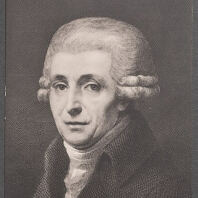Joseph Haydn
Composer
He loved the unconventional: Joseph Haydn’s love of experimentation did not – like Beethoven’s, for example – spring primarily from a desire for expression. Rather, it was based on the principle of questioning rules through original counter-designs. In 1799, the Leipzig Allgemeine musikalische Zeitung wrote about Haydn’s symphonies that “surprise cannot perhaps be driven any further in music”.
Joseph Haydn was born in 1732 in the Lower Austrian village of Rohrau near the Hungarian border. After two years with relatives in Hainburg an der Donau, where he learned “the musical basics along with other youthful necessities”, he was sent to Vienna. There, as a chorister of the Kantorei St Stephan, he received lessons in Latin, religion, mathematics and German as well as a comprehensive musical education – from “very good masters”, as he later said. At the age of 20, Haydn became pupil, valet and musical assistant to the famous Neapolitan opera composer Nicola Porpora, who he said gave him “the true fundamentals of composition”. After an appointment as kapellmeister to Count Morzin, the composer finally began his many years of service at the court of Prince Eszterházy in Eisenstadt. He had a special fondness for his secluded residence in the Hungarian Eszterháza palace on the Neusiedler See. During this period, Haydn’s life was played out far from the major cities, without any direct connection to the international music scene – not even the news of the storming of the Bastille in the summer of 1789 seems to have reached him. Nevertheless, the composer received commissions from all over Europe, for example from Paris, where the Loge Olympique concert society commissioned six new “Grand Symphonies” from him (Nos. 82–87). After Prince Nikolaus died in 1790, Haydn also conquered the public concert halls with his music. He established a particularly close relationship with London, where he became one of the most successful composers of his time.